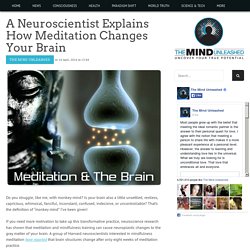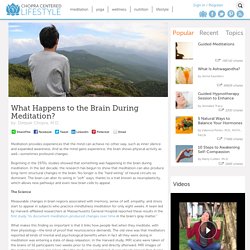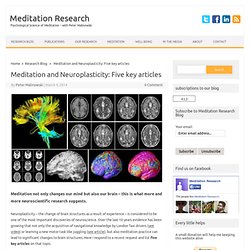

Neuroscience of Mindfulness. A Neuroscientist Explains How Meditation Changes Your Brain. Do you struggle, like me, with monkey-mind?

Is your brain also a little unsettled, restless, capricious, whimsical, fanciful, inconstant, confused, indecisive, or uncontrollable? Meditation 101: The Neuroscience of Why Meditation Works As yogis have known for centuries and scientists can now prove, the benefits of meditation are profound.

Meditation is perhaps the most crucial instrument to harness the power of thought, cultivate more peace, clarity and happiness. Learning to train the brain and focus our attention is crucial to thriving and cultivating a peak performance in any endeavor. Long-time psychotherapist Dr. Ron Alexander, author of Wise Mind, Open Mind, speaks of MIND STRENGTH, or the resiliency, efficacy and emotional intelligence that arise as we begin the process of controlling the mind. Harvard neuroscientist Sara Lazar meditation interview. Moyan Brenn / Flickr Mindfulness meditation is incredibly popular right now.

What happens in our brain when we practice mindfulness? What Happens to the Brain During Meditation? Meditation provides experiences that the mind can achieve no other way, such as inner silence and expanded awareness.

And as the mind gains experience, the brain shows physical activity as well—sometimes profound changes. Beginning in the 1970s, studies showed that something was happening in the brain during meditation. In the last decade, the research has begun to show that meditation can also produce long-term structural changes in the brain. No longer is the “hard wiring” of neural circuits so dominant. The brain can alter its wiring in “soft” ways, thanks to a trait known as neuroplasticity, which allows new pathways and even new brain cells to appear. The Science Measurable changes in brain regions associated with memory, sense of self, empathy, and stress start to appear in subjects who practice mindfulness meditation for only eight weeks. Another study compared long-term meditators with a control group. Harvard Study Unveils What Meditation Literally Does To The Brain. Meditation Changes the Brain’s Wiring and Mindset, Harvard Studies Show [FEATURE] : Life&Style.
A series of Harvard University studies led by Sara Lazar proved that meditation practices actually create changes in the way the brain is wired and affects regions associated with stress, well-being and intelligence.
![Meditation Changes the Brain’s Wiring and Mindset, Harvard Studies Show [FEATURE] : Life&Style](http://cdn.pearltrees.com/s/pic/th/meditation-changes-headlines-108569005)
By Debra Stern | Jan 16, 2015 05:05 PM EST Harvard University studies led by Sara Lazar proved that meditation practices actually create changes in the way the brain is wired and affects regions associated with stress, well-being and intelligence. (Photo : Wikimedia Commons) Sarah Lazar's voice was calming even over the phone as she demonstrated, for this interview, a typical start to a mindfulness practice. "Notice you are breathing in and breathing out. "It may sound incredibly boring," she says with a chuckle. According to Lazar, assistant professor of psychology at Harvard University, observing your breath without self judgment actually changes the way your brain is wired. She ought to know. More important for the study, their brain scans reflected the emotional shift. Meditation and Neuroplasticity: Five key articles. Meditation not only changes our mind but also our brain – this is what more and more neuroscientific research suggests.

Neuroplasticity – the change of brain structures as a result of experience – is considered to be one of the most important discoveries of neuroscience. Over the last 10 years evidence has been growing that not only the acquisition of navigational knowledge by London Taxi drivers (see video) or learning a new motor task like juggling (see article), but also meditation practice can lead to significant changes to brain structures.
Here I respond to a recent request and list five key articles on that topic. Article 1: Meditation experience is associated with increased cortical thickness To my knowledge this is the first study showing differences in brain structure between meditators and non-meditators. Lazar, S. Doi: 10.1097/01.wnr.0000186598.66243.19. Meditation May Protect Your Brain. For thousands of years, Buddhist meditators have claimed that the simple act of sitting down and following their breath while letting go of intrusive thoughts can free one from the entanglements of neurotic suffering.

Now, scientists are using cutting-edge scanning technology to watch the meditating mind at work. They are finding that regular meditation has a measurable effect on a variety of brain structures related to attention — an example of what is known as neuroplasticity, where the brain physically changes in response to an intentional exercise. A team of Emory University scientists reported in early September that experienced Zen meditators were much better than control subjects at dropping extraneous thoughts and returning to the breath.
The same researchers reported last year that longtime meditators don’t lose gray matter in their brains with age the way most people do, suggesting that meditation may have a neuro-protective effect. Where does all this lead? Meditation Found To Increase Brain Size « Great Human Capital. People who meditate grow bigger brains than those who don’t.

Researchers at Harvard, Yale, and the Massachusetts Institute of Technology have found the first evidence that meditation can alter the physical structure of our brains. Brain scans they conducted reveal that experienced meditators boasted increased thickness in parts of the brain that deal with attention and processing sensory input. In one area of gray matter, the thickening turns out to be more pronounced in older than in younger people. That’s intriguing because those sections of the human cortex, or thinking cap, normally get thinner as we age. Our data suggest that meditation practice can promote cortical plasticity in adults in areas important for cognitive and emotional processing and well-being,” says Sara Lazar, leader of the study and a psychologist at Harvard Medical School. Meditation found to increase brain size.
Kris Snibbe/Harvard News Office Sara Lazar (center) talks to research assistant Michael Treadway and technologist Shruthi Chakrapami about the results of experiments showing that meditation can increase brain size.

People who meditate grow bigger brains than those who don’t. Researchers at Harvard, Yale, and the Massachusetts Institute of Technology have found the first evidence that meditation can alter the physical structure of our brains. Brain scans they conducted reveal that experienced meditators boasted increased thickness in parts of the brain that deal with attention and processing sensory input. In one area of gray matter, the thickening turns out to be more pronounced in older than in younger people. Meditation experience is associated with increased cortical thickness.
Mindfulness meditation training changes brain structure in eight weeks. Participating in an 8-week mindfulness meditation program appears to make measurable changes in brain regions associated with memory, sense of self, empathy and stress.

Study reveals gene expression changes with meditation (Dec. 4. Dec. 4, 2013 With evidence growing that meditation can have beneficial health effects, scientists have sought to understand how these practices physically affect the body. A new study by researchers in Wisconsin, Spain, and France reports the first evidence of specific molecular changes in the body following a period of mindfulness meditation. The study investigated the effects of a day of intensive mindfulness practice in a group of experienced meditators, compared to a group of untrained control subjects who engaged in quiet non-meditative activities.
After eight hours of mindfulness practice, the meditators showed a range of genetic and molecular differences, including altered levels of gene-regulating machinery and reduced levels of pro-inflammatory genes, which in turn correlated with faster physical recovery from a stressful situation. Richard J. The study was published in the journal Psychoneuroendocrinology. Eight weeks to a better brain. Participating in an eight-week mindfulness meditation program appears to make measurable changes in brain regions associated with memory, sense of self, empathy, and stress. In a study that will appear in the Jan. 30 issue of Psychiatry Research: Neuroimaging, a team led by Harvard-affiliated researchers at Massachusetts General Hospital (MGH) reported the results of their study, the first to document meditation-produced changes over time in the brain’s gray matter.
“Although the practice of meditation is associated with a sense of peacefulness and physical relaxation, practitioners have long claimed that meditation also provides cognitive and psychological benefits that persist throughout the day,” says study senior author Sara Lazar of the MGH Psychiatric Neuroimaging Research Program and a Harvard Medical School instructor in psychology. How Mindfulness Can Change Your Brain [Jeffrey Schwartz] Meditation Strengthens The Mind. 22nd March 2012 By Science Daily Earlier evidence out of UCLA suggested that meditating for years thickens the brain (in a good way) and strengthens the connections between brain cells.
Now a further report by UCLA researchers suggests yet another benefit. Eileen Luders, an assistant professor at the UCLA Laboratory of Neuro Imaging, and colleagues, have found that long-term meditators have larger amounts of gyrification (“folding” of the cortex, which may allow the brain to process information faster) than people who do not meditate. Further, a direct correlation was found between the amount of gyrification and the number of meditation years, possibly providing further proof of the brain’s neuroplasticity, or ability to adapt to environmental changes. Meditation Sharpens the Mind. Three months of intense training in a form of meditation known as "insight" in Sanskrit can sharpen a person's brain enough to help them notice details they might otherwise miss. These new findings add to a growing body of research showing that millennia-old mental disciplines can help control and improve the mind, possibly to help treat conditions such as attention deficit hyperactivity disorder (ADHD).
"Certain mental characteristics that were previously regarded as relatively fixed can actually be changed by mental training," University of Wisconsin neuroscientist Richard Davidson said. Meditation Health Benefits: What The Practice Does To Your Body. We hear it all the time: Meditation can improve our creative thinking, our energy, stress levels and even our success. Prominent artists, businessmen and politicians cop to the practice. Would it work for you? "It did to my mind what going to the gym did to my body -- it made it both stronger and more flexible," said Dr.
Stress reduction from just 25 minutes of mindfulness meditation. New Research Proves That Not Only Does Meditation Calm You Down, It Actually Alters Your Brain. By Caitlin White 11/29/2014. Harvard Yoga Scientists Find Proof of Meditation Benefit. Scientists are getting close to proving what yogis have held to be true for centuries -- yoga and meditation can ward off stress and disease. The Physical and Psychological Effects of Meditation. By Steven Donovan, Michael Murphy, and Eugene Taylor. Does Meditation Make You Smarter, Happier, More Focused and Take Years Off Your Brain? - meditativescience.net.
Jon Kabat-Zinn - "The Healing Power of Mindfulness" How Mindfulness Helps You See What's Missing (And Why You'd Want To) Mindfulness gives you time to make choices. How meditation might ward off the effects of ageing. High in the mountains of northern Colorado, a 100-foot tall tower reaches up through the pinetops. Brightly coloured and strung with garlands, its ornate gold leaf glints in the sun. With a shape that symbolises a giant seated Buddha, this lofty stupa is intended to inspire those on the path to enlightenment. Meditation associated with slower age-related loss of gray matter in the brain. Negative correlations between global gray matter and age. The X-axis displays the chronological age (in years); the Y-axis displays the global gray matter volume (in ml).
Note the less-steep slope of the regression line in meditators (yellow) compared to controls (cyan). (Credit: Frontiers in Psychology) Results of a new study by UCLA researchers suggest that meditation may help preserve the brain’s gray matter, the tissue that contains neurons. The researchers cautioned, however, that they cannot draw a direct, causal connection between meditation and preserving gray matter in the brain. Since 1970, life expectancy around the world has risen dramatically, with people living more than 10 years longer. The bad news is that starting when people are in their mid-to-late-20s, the brain begins to wither — its volume and weight begin to decrease. “In that light, it seems essential that longer life expectancies do not come at the cost of a reduced quality of life,” said Dr.
How mindfulness training affects health. Over the past decade, there have been many encouraging findings suggesting that mindfulness training can improve a broad range of mental and physical health problems. Yet, exactly how mindfulness positively impacts health is not clear. Carnegie Mellon University's J. 20 Scientific Reasons to Start Meditating Today: New research shows meditation boosts your health… 20 Scientific Reasons to Start Meditating Today: New research shows meditation boosts your health, happiness, and success! I started meditating soon after 9/11. I was living in Manhattan, an already chaotic place, at an extremely chaotic time. I realized I had no control over my external environment. But the one place I did have a say over was my mind, through meditation. When I started meditating, I did not realize it would also make me healthier, happier, and more successful. It Boosts Your HEALTH.
What is Meditation / Mindfulness Good for? Benefits of meditation. Studies have shown that meditating regularly can help relieve symptoms in people who suffer from chronic pain, but the neural mechanisms underlying the relief were unclear. Now, MIT and Harvard researchers have found a possible explanation for this phenomenon. In a study published online April 21 in the journal Brain Research Bulletin, the researchers found that people trained to meditate over an eight-week period were better able to control a specific type of brain waves called alpha rhythms.
“These activity patterns are thought to minimize distractions, to diminish the likelihood stimuli will grab your attention,” says Christopher Moore, an MIT neuroscientist and senior author of the paper. The Benefits of Meditation. The Scientific Power of Meditation. 11 Reasons To Meditate Daily.